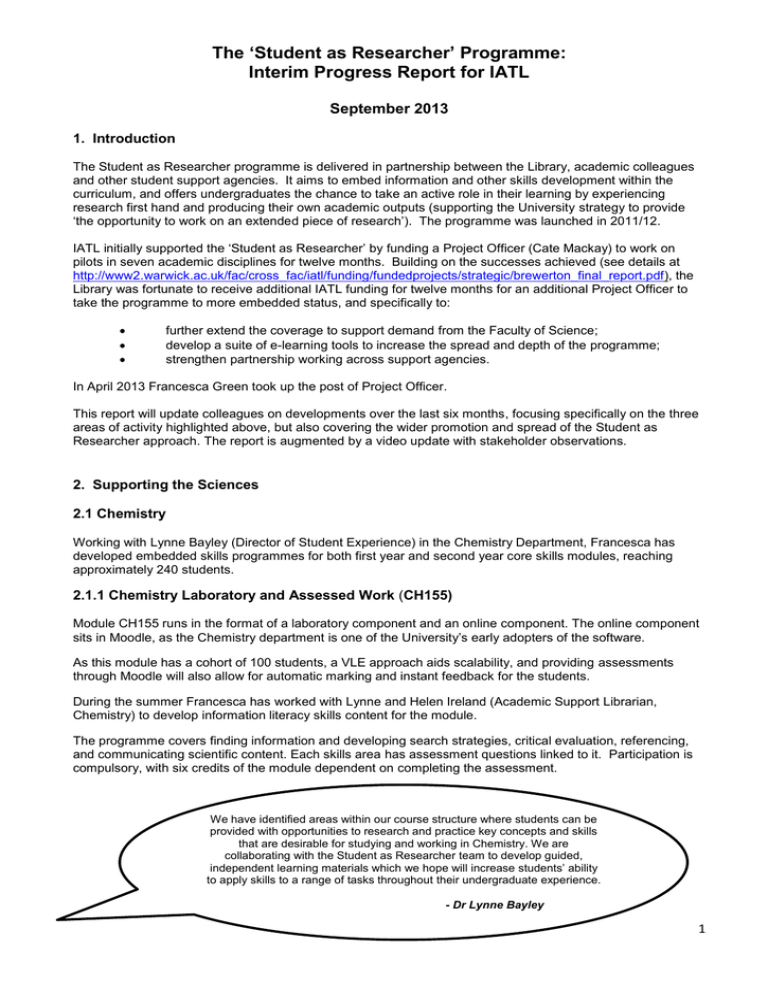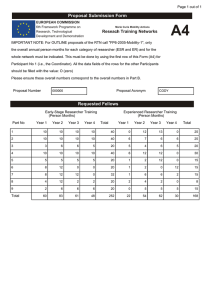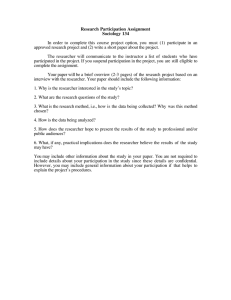‘Student as Researcher’ Programme: The Interim Progress Report for IATL
advertisement

The ‘Student as Researcher’ Programme: Interim Progress Report for IATL September 2013 1. Introduction The Student as Researcher programme is delivered in partnership between the Library, academic colleagues and other student support agencies. It aims to embed information and other skills development within the curriculum, and offers undergraduates the chance to take an active role in their learning by experiencing research first hand and producing their own academic outputs (supporting the University strategy to provide ‘the opportunity to work on an extended piece of research’). The programme was launched in 2011/12. IATL initially supported the ‘Student as Researcher’ by funding a Project Officer (Cate Mackay) to work on pilots in seven academic disciplines for twelve months. Building on the successes achieved (see details at http://www2.warwick.ac.uk/fac/cross_fac/iatl/funding/fundedprojects/strategic/brewerton_final_report.pdf), the Library was fortunate to receive additional IATL funding for twelve months for an additional Project Officer to take the programme to more embedded status, and specifically to: further extend the coverage to support demand from the Faculty of Science; develop a suite of e-learning tools to increase the spread and depth of the programme; strengthen partnership working across support agencies. In April 2013 Francesca Green took up the post of Project Officer. This report will update colleagues on developments over the last six months, focusing specifically on the three areas of activity highlighted above, but also covering the wider promotion and spread of the Student as Researcher approach. The report is augmented by a video update with stakeholder observations. 2. Supporting the Sciences 2.1 Chemistry Working with Lynne Bayley (Director of Student Experience) in the Chemistry Department, Francesca has developed embedded skills programmes for both first year and second year core skills modules, reaching approximately 240 students. 2.1.1 Chemistry Laboratory and Assessed Work (CH155) Module CH155 runs in the format of a laboratory component and an online component. The online component sits in Moodle, as the Chemistry department is one of the University’s early adopters of the software. As this module has a cohort of 100 students, a VLE approach aids scalability, and providing assessments through Moodle will also allow for automatic marking and instant feedback for the students. During the summer Francesca has worked with Lynne and Helen Ireland (Academic Support Librarian, Chemistry) to develop information literacy skills content for the module. The programme covers finding information and developing search strategies, critical evaluation, referencing, and communicating scientific content. Each skills area has assessment questions linked to it. Participation is compulsory, with six credits of the module dependent on completing the assessment. We have identified areas within our course structure where students can be provided with opportunities to research and practice key concepts and skills that are desirable for studying and working in Chemistry. We are collaborating with the Student as Researcher team to develop guided, independent learning materials which we hope will increase students’ ability to apply skills to a range of tasks throughout their undergraduate experience. - Dr Lynne Bayley 1 2.1.2 Chemistry Key Skills (CH2A5) Francesca has also worked on the second year Key Skills module. This utilizes a blended approach of face-toface delivery in workshops and online content. The principal learning outcomes of this compulsory module are to: retrieve relevant information from a range of paper and electronic resources; make use of online databases to search the literature. The programme supports this by guiding students through developing search strategies, searching specialist databases, referencing and avoiding plagiarism. The online element of CH2A5 likewise sits in Moodle, with a similar format and structure to CH155. As this year’s second year module cohort will not have experienced the first year CH155 module, the content covered will be very similar, to ensure that the undergraduate body will be experiencing embedded information literacy skills development. This will be modified in future iterations. 2.1.3 Chemistry Online Tutorial In addition to the two modules mentioned above, Francesca has developed an online Chemistry tutorial (Figure 1) which will build upon this work and will support any future developments within the department. Figure 1. Chemistry Tutorial Home Page 2.2 Psychology Francesca and Sam Johnson (Academic Support Librarian, Psychology) are in the early stages of working with Friederike Schlaghecken (Department of Psychology) on applying the Student as Researcher approach within a new study skills module, a compulsory module for all first year students, running from October 2014. The aims of the module are for students to engage in critical thinking and self-directed learning whilst developing essential academic skills. 2.3 Other departments We are currently starting discussions with Computer Science, Engineering and Mathematics about developing programmes for their students. We are also considering how we can develop more Faculty-wide approaches and would welcome any advice from IATL on how to progress this. 2 3. Developing e-Learning 3.1 Infrastructure It is important for the efficiency of the programme that we develop a suite of re-usable e-learning tools. The Library is working with colleagues to get the most out of Moodle to really enhance the student experience: working with Chemistry (see above) has been a great opportunity in this regard. We have also recently adopted Articulate e-learning software, which Francesca has used to create a number of interactive guides. Articulate allows students to choose their own route to learn, navigating through the tutorial at their own pace, interacting with the different layers, providing a more learner-centred approach. 3.2 Tutorial development With the success of the WBS Student as Researcher tutorial (developed in the initial pilot), the tutorial template has been adopted, finessed and implemented to provide e-learning packages for Business and Economics, Politics and Sociology, Film and Television Studies, English dissertation studies and (soon to be released) Law, and Chemistry. Francesca has also worked with Kate Williams (Academic Support Librarian, English) to create a video (Figure 2) which captures the process of developing an effective search strategy. The original audience for this were undergraduate English students undertaking their dissertation. The video has since been re-used and features on the French, Hispanic Studies and Italian Library support webpages, and has been used more widely on the Library’s Skills Development pages. Figure 2. Search Strategy Video 4. Working with other agencies The Library is using the Student as Researcher approach to strengthen partnerships with other support agencies across campus. 3 4.1 A cross-University approach Ant Brewerton is currently working with colleagues across the Student and Academic Services Network to create a more coherent, consistent and cost-effective model of skills support, based around student lifecycles (Figure 3). Francesca and Helen Curtis (Academic Support Manager (Teaching & Learning)) are currently working with the Undergraduate team of Student Careers and Skills on a mapping exercise to create a clear picture of the skills offered to students in order to identify opportunities for service development and promotion. Figure 3. An example of student lifecycles – the Undergraduate Lifecycle 4.2 URSS Francesca has also been involved in the URSS Researcher Development days representing the Library to promote the services we offer to the undergraduate researchers as they work on completing an extended piece of research. 4.3 IGGY IGGY approached the Library to deliver a Student as Researcher session to their Junior Commissioners based on online research skills. The Project Officers delivered the session to the international cohort of students, aged 13-18 years old. The session was a huge success and was a great example of working with other agencies across the University to enhance the (wider) student experience. 4 Thank you for teaching us how to conduct research online in a more efficient manner, which is absolutely essential to our project... Your workshop was an immense success, though I really would have loved listening to you longer. - IGGY Junior Commissioner Figure 4. IGGY Junior Commissioners and feedback from their Student as Researcher session 5. Advocacy/Dissemination 5.1 Teaching and Learning Showcase The Project Officers presented an interactive poster (Figure 5) at the University’s Teaching and Learning Showcase (19 June 2013) and Cate and Cathia Jenainati (English and Comparative Literary Studies) delivered a paper on initiatives with English entitled ‘Students as researchers and innovative critical writers’ (see http://www2.warwick.ac.uk/services/ldc/tlshowcase/tlshowcase2013/programme/learnspace1/). The event generated further interest in the programme that we aim to build upon. Figure 5. Articulate poster presented at the Teaching and Learning Showcase, 2013 5 5.2 Promotional videos A series of ‘Spotlight on Student as Researcher’ videos have been created in conjunction with IATL as a tool for advocacy. The videos feature interviews with the Director of IATL, academic colleagues, Academic Support Librarians and the Project Officers, promoting their positive experiences of the Student as Researcher approach. The videos will appear on the Library’s newly-designed website. 5.3 External promotion Dissemination work has also taken place to an external audience at the ‘Librarians who teach: Engaging Learners in the Digital Age’ conference on 13 June 2013. Cate and Helen Curtis showcased the Student as Researcher approach in one of the conferences case studies. 5.4 WATE successes In May 2013, Ant Brewerton and Cate Mackay were Awarded and Commended (respectively) with Warwick Awards for Teaching Excellence, partly for their Student as Researcher activities. This work was recognised for having exceptional impact on the student learning experience and was highlighted by Ann Caesar in her award-giving speech. 6. Wider development On a wider level, the Student as Researcher programme has continued to grow beyond the initial pilots, for example: the French ‘In the Family Way’ module has run its second Student as Researcher programme, this time providing the students with greater support for developing their presentation skills which impacted positively on the quality of papers delivered at the Student Symposium; for WBS the Library is working more closely with Rochelle Sibley (Warwick Writing Programme) to help students further develop their academic writing skills; the wiki approach pioneered with French has been used to good effect in English as students have created their own e-Books of Commonplace in the programme developed with Cathia Jenainati (see 5.1); for Classics, the ‘Students as Researchers at the British Museum’ event culminated in a successful poster competition in the Teaching Grid. More work is underway to embed the programme further into the curriculum. The Library would be keen to reflect on this report and consider further avenues for growth with IATL in the near future. Ant Brewerton Head of Academic Services antony.brewerton@warwick.ac.uk Francesca Green Student as Researcher Project Officer f.r.green@warwick.ac.uk The Library 30 September 2013 6




